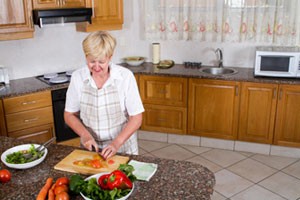 As we age, our dietary needs change, so making the proper adjustments to the food we eat is essential to living a healthy life. Proper nutrition can sharpen the mind, help you live longer and overall, make you feel good.
As we age, our dietary needs change, so making the proper adjustments to the food we eat is essential to living a healthy life. Proper nutrition can sharpen the mind, help you live longer and overall, make you feel good.
The Changes
Our bodies function differently as we get older, changing the way we taste, digest and prepare food. After the age of 40, your metabolism slows down, causing your body to burn fewer calories. Because of this, it is suggested to change your calorie intake. Men over 50 should be eating 2000-2400 calories a day, while women over 50 should be consuming 1600-2000 calories a day. These amounts depend on the person’s daily activity – meaning that the more active you are, the more calories you should consume.
Aging causes the digestive system to slow down as well, which makes it more difficult to process vitamins and minerals that are necessary to maintain alertness, memory and circulation. Medications and health problems can influence one’s appetite and taste buds, which could lead to adding more salt and sugar to foods. Loneliness and depression are also common in older adults, which may lead to over or under-eating.
What To Eat
To avoid the consequences that come with the changes listed above, focus on these foods for a healthy and happy life:
Fruits: Consuming 1 ½ – 2 servings of fruit a day is strongly suggested. Instead of juices, try to focus more on whole fruits in order to get more fiber and vitamins.
Vegetables: A daily intake of 2 – 2 ½ cups of veggies a day is suggested for older adults. Go for the dark, leafy greens that are rich in antioxidants, such as kale, spinach and broccoli.
Calcium: Older adults are suggested to consume 1200 mg of calcium a day, which is important for preventing osteoporosis and bone fractures. Milk, yogurt, cheese, tofu, broccoli, almonds and kale are all great sources of calcium.
Grains: Older adults should consume 6-7 ounces of whole grains each day. Be smart with your carbs for more nutrients and fiber.
Protein: When it comes to protein intake, older adults should be consuming 1 – 1 ½ g per kg of their body weight. Evenly dividing protein consumption throughout the day is suggested, and you should vary your sources as well. Do not rely on red meat, instead try fish, beans, peas, nuts, eggs, milk, cheese and seeds.
Other Considerations: Along with these changes, older adults should also take note of their sodium intake and try to keep it limited. This will help reduce high blood pressure. Avoid processed, frozen or restaurant foods as they are typically high in sodium. Adults over the age of 60 are also more prone to dehydration, so make sure you are drinking small amounts of water throughout the day.
At The Oscar and Ella Wilf Campus for Senior Living, we have a dietician that reviews menus and works with residents that have special dietary needs. For more information, contact us at (732) 568-1155, [email protected] or visit us at www.wilfcampus.org.
